“Collagen supplements improve skin moisture, elasticity, and hydration when orally administered. Additionally, collagen reduces the wrinkling and roughness of the skin.”
Hend Al-Atif, Collagen Supplements for Aging and Wrinkles: A Paradigm Shift in the Fields of Dermatology and Cosmetics
Collagen is a protein that gives your skin its elasticity and strength. It’s an important ingredient in many anti-aging creams and products, but what does collagen do for your face?
Let’s take a closer look at collagen and how it can benefit your skin.
Collagen’s role in the body
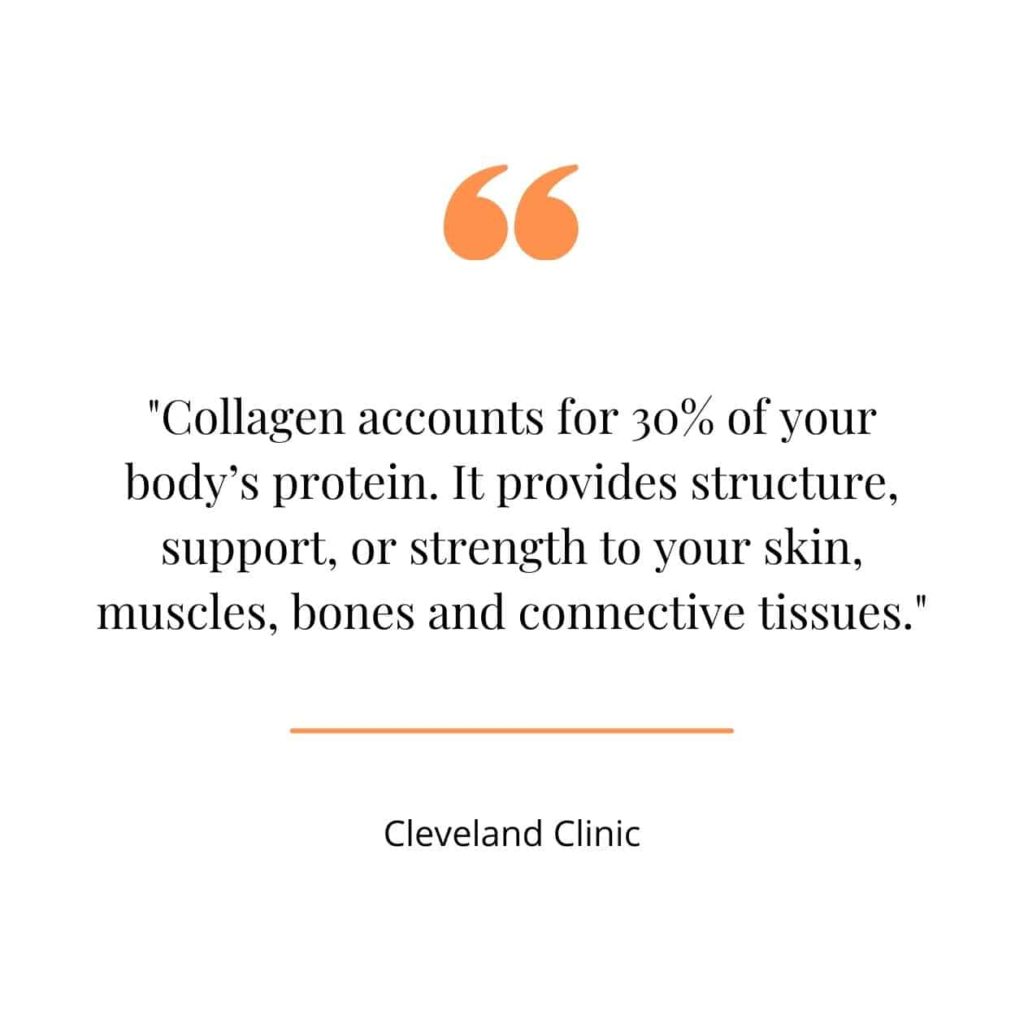
Collagen is not just a part of your skin and nails, it’s also found in other parts of your body, such as your bones and joints. It helps keep them strong and healthy.
As you get older, you may start to experience problems with your bones and joints, this is due mostly to a decrease in collagen production. It’s inevitable and happens to everyone, so many people turn to taking collagen supplements. These supplements may help reduce the problems associated with aging.
Collagen supplements are a great way to keep your skin looking young and healthy. They are also a good way to keep your bones and joints healthy and strong as you get older.
If you’re looking for a way to slow down the signs of aging, collagen supplements may be what you need.
When should I use collagen on my face?
Collagen peptides are a form of collagen that can be taken as a supplement. They work to increase skin hydration, reverse skin damage, and reduce the appearance of wrinkles.
Collagen supplements can’t do all the work on their own, though, and should be used in conjunction with a balanced diet and regular skincare routine for best results.
Collagen supplements can be taken at any time of day, but they are most effective when used consistently.
Right before bed is a great time to apply collagen to your face, as this is when your skin repairs and renews itself while you rest and if you set a designated time to do it everyday, you’ll be more likely to keep up with the routine and reap the greatest benefits!
The skin benefits of collagen
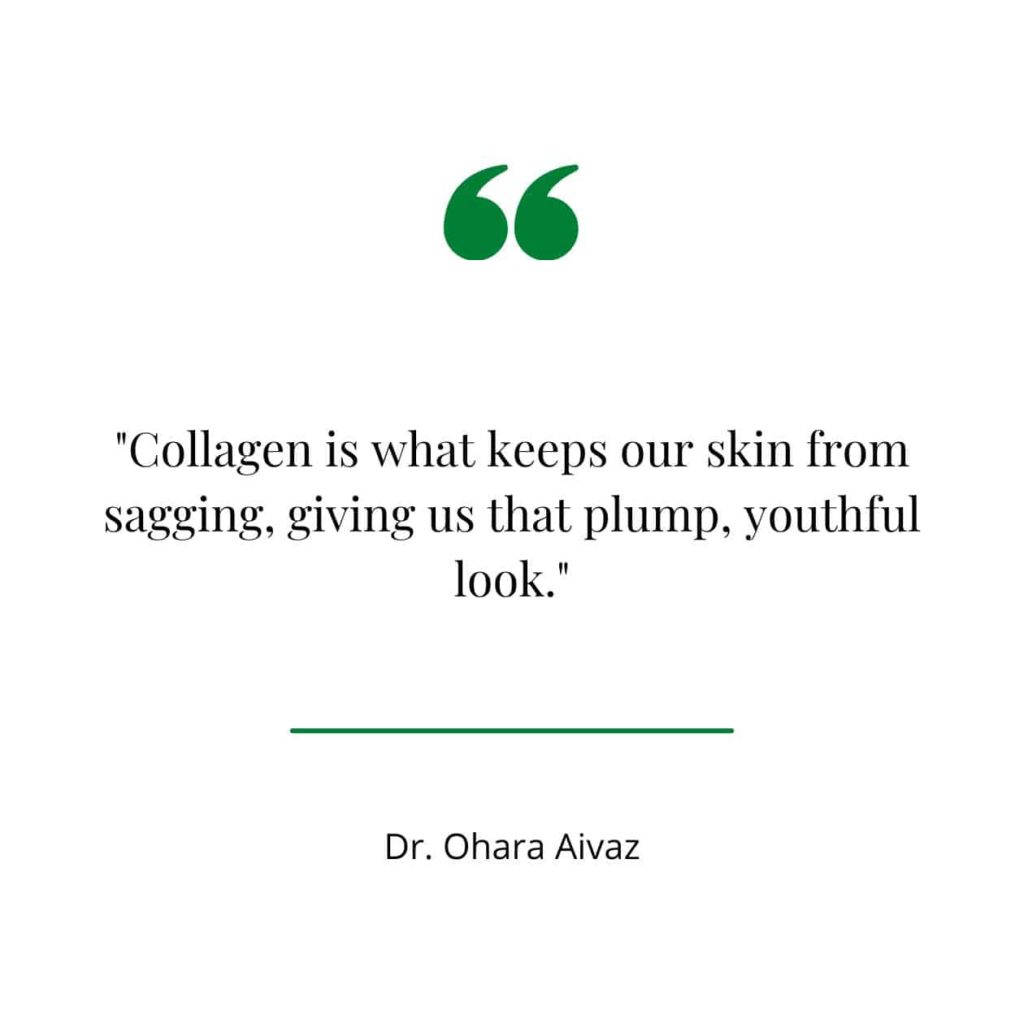
Collagen is used by the body to make skin firm, supple, and smooth.
A study shows that taking collagen supplements helps reduce many forms of skin issues including wrinkles, stretch marks, and even scars. Topical creams that contain collagen may be useful in improving skin texture.
Using collagen products on your face can help improve your skin’s elasticity, hydration, and youthfulness.
Collagen can also help to reduce the appearance of wrinkles, fine lines, and scars. If you’re looking for a way to keep your skin looking its best, collagen may be the answer!
How collagen breaks down
As we age, our collagen production decreases, which can lead to a variety of problems like wrinkles, sagging skin, and hair loss. This is because collagen is responsible for keeping our skin firm, supple, and smooth. Without it, our skin can’t look its best.
Luckily, there are ways to increase collagen production and keep your skin looking its best!
One way to increase collagen production is by using products that contain collagen peptides.
Collagen peptides are a form of collagen that can be taken as a supplement. They work to increase skin hydration, reverse skin damage, and reduce the appearance of wrinkles.
Another way to keep your collagen levels up is by using products that contain retinol.
According to a study published in the National Library of Medicine, retinol is a Vitamin A derivative that helps to stimulate collagen production. It can be found in over-the-counter skin care products as well as in prescription strength retinoids.
Which factors contribute to the loss of collagen in the skin?
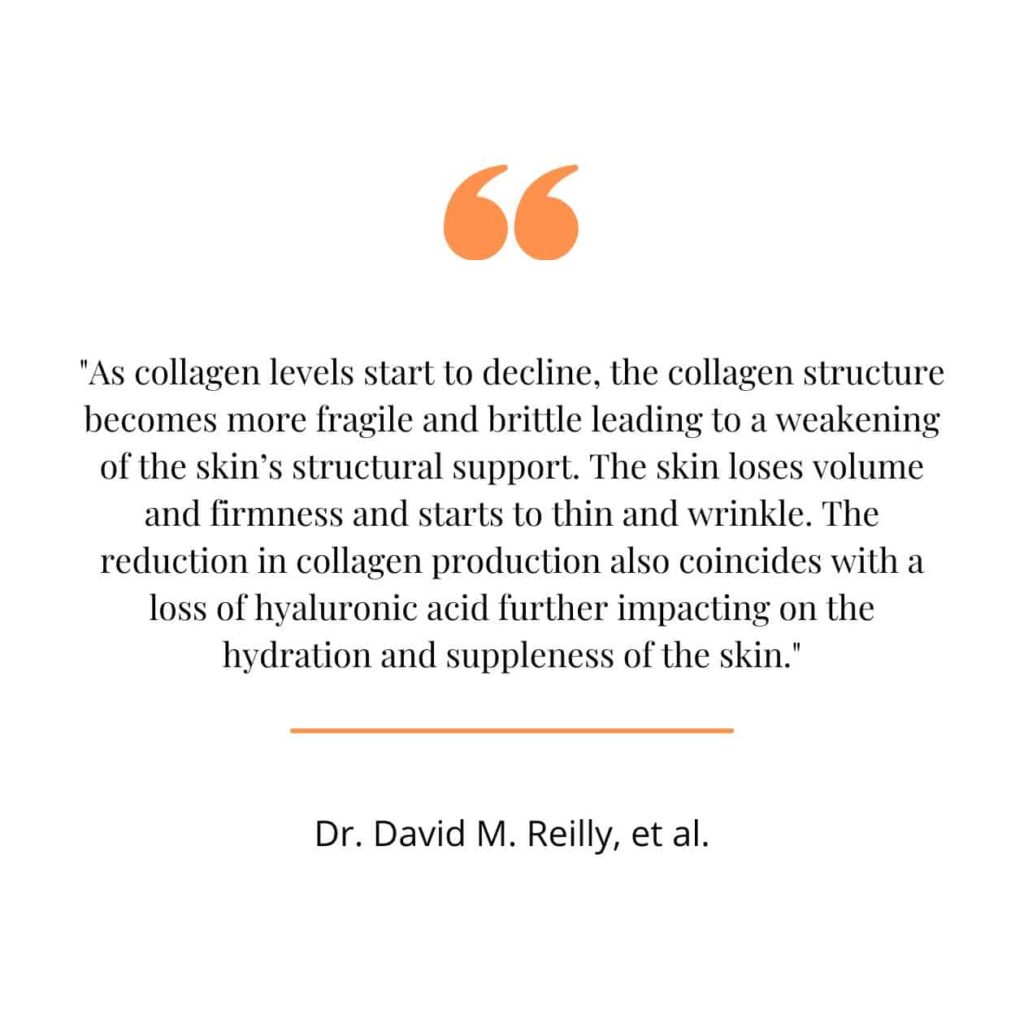
With age, collagen starts to break down. Your genes can affect how quickly that degeneration occurs. Free radicals damage collagen, which is our skin’s enemy.
Environmental factors, bad lifestyle habits, and a poor diet all cause free radical formation, which accelerates collagen breakdown.
We’ll talk about smoking for a moment. Smoking may allow free radicals to attack collagen fibers, making them weaker and of poorer quality.
It’s no surprise, therefore, that the skins of smokers tend to look damaged and wrinkly, particularly around the mouth.
Protecting your natural collagen for healthy skin
Ultraviolet light from the sun causes collagen breakdown.
Foods rich in antioxidants can prevent collagen breakdown and dermatologists recommend discussing skincare regimens balanced with a healthy diet if you have any concerns about your natural collagen production.
There are a few things you can do to help protect your collagen and keep your skin looking its best:
- Use sunscreen with an SPF of 30 or higher – this will help protect your skin from the sun’s harmful UV rays.
- Eat foods that are rich in antioxidants – these include fruits and vegetables like oranges, berries, tomatoes, and leafy greens.
- Avoid smoking – as we mentioned before, smoking can damage collagen fibers and accelerate the aging process.
- Get enough sleep – sleep is when your body repairs itself, so be sure to get 7-8 hours per night.
- Drink plenty of water – water helps to keep your skin hydrated and prevents free radicals from damaging collagen fibers.
Supplements help replace what’s naturally lost through aging
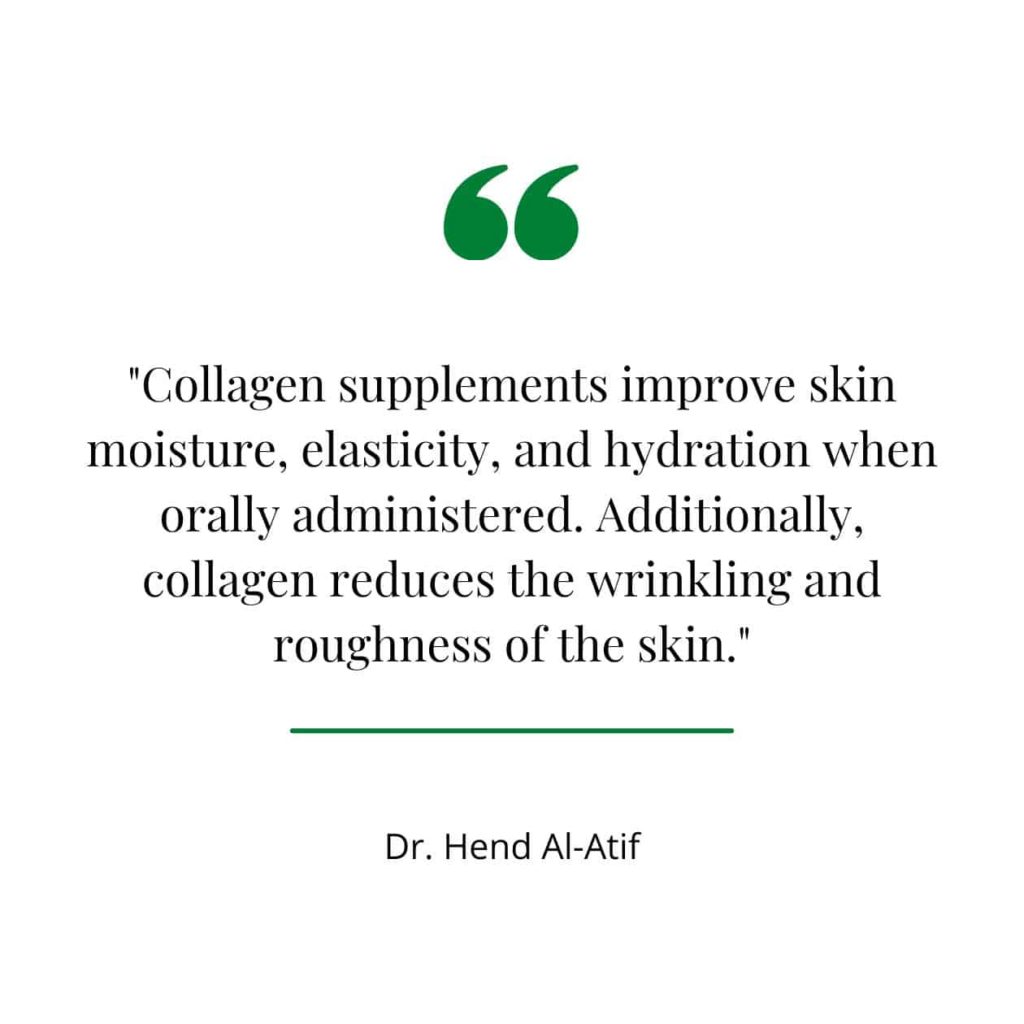
Collagen is the glue that holds your body together. Your body starts producing less collagen as you get older, and you need more collagen in your body to stay healthy. This is where supplements play their role.
Adding collagen peptides to your diet may help replace what your body begins losing as you age.
Collagen peptides are a form of collagen that can help your body replace what it loses as you get older. As we age, our bodies start producing less collagen, which can lead to a variety of health problems.
Adding collagen peptides to your diet may help keep your body healthy by providing it with the collagen it needs.
Do collagen supplements work?
While there is no hard, medical evidence that supplements are going to magically make you look 20 years younger, there have been plenty of basic studies that show a correlation between taking collagen supplements and improvements to skin, nails, hair growth, and even joint and digestive problems.
What about collagen creams?
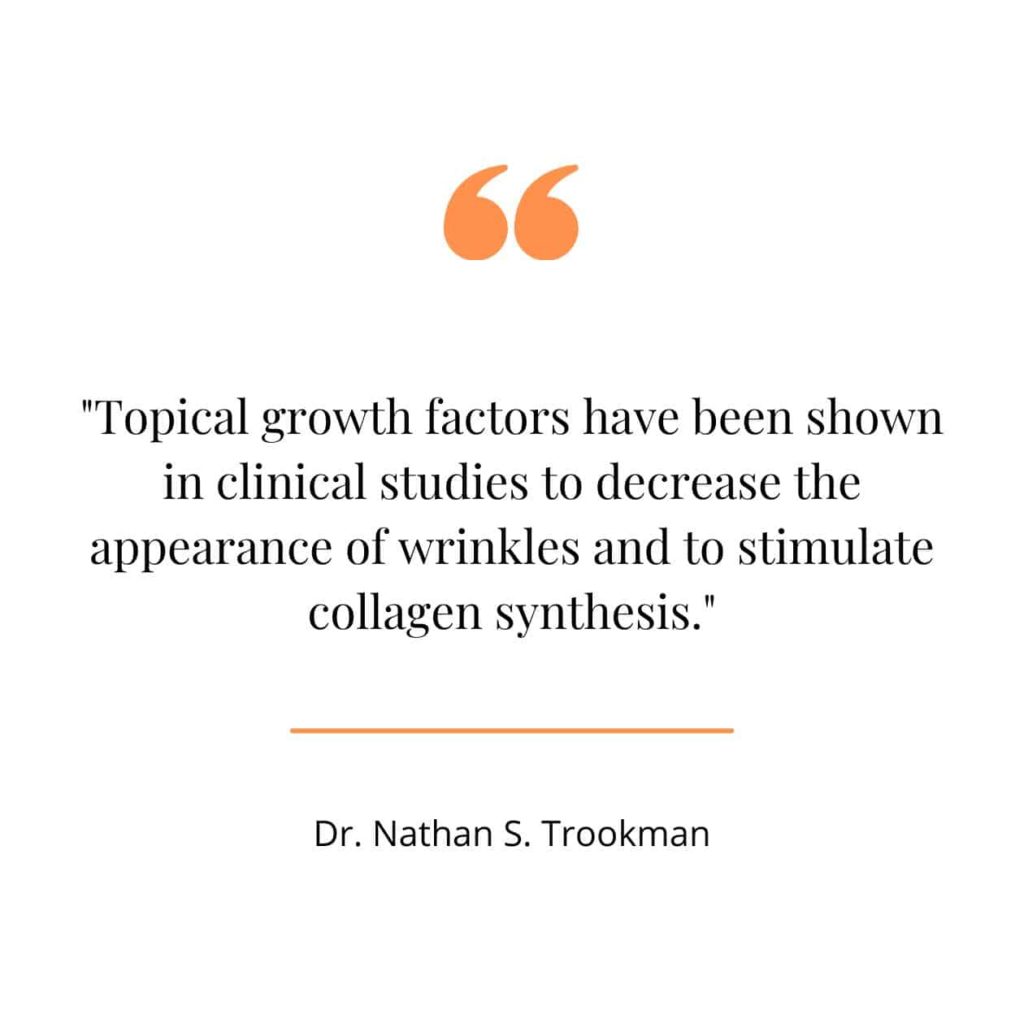
Topical treatments like Retinol and Tretinoin are scientifically proven to promote collagen formation. Antioxidants such as Vitamin C can reverse the inflammation caused by damaged collagen.
Collagen creams are popular among people who want to improve the appearance of their skin. There are many different types of collagen creams on the market, and some of them are more effective than others.
If you are looking for a collagen cream, be sure to look for one that contains Retinol. Retinol helps your face rebuild collagen by increasing the production of new skin cells. It also helps promote cell turnover to keep your skin looking younger and healthier.
These ingredients will help your skin to produce more collagen. You should also look for a cream that contains antioxidants such as Vitamin C, which can help to repair the damage.
How to restore collagen in the face
There are several things one can do to increase collagen in the face.
Some people turn to expensive procedures, like collagen injections.
However, there are less invasive and more affordable ways to increase collagen production.
Diet
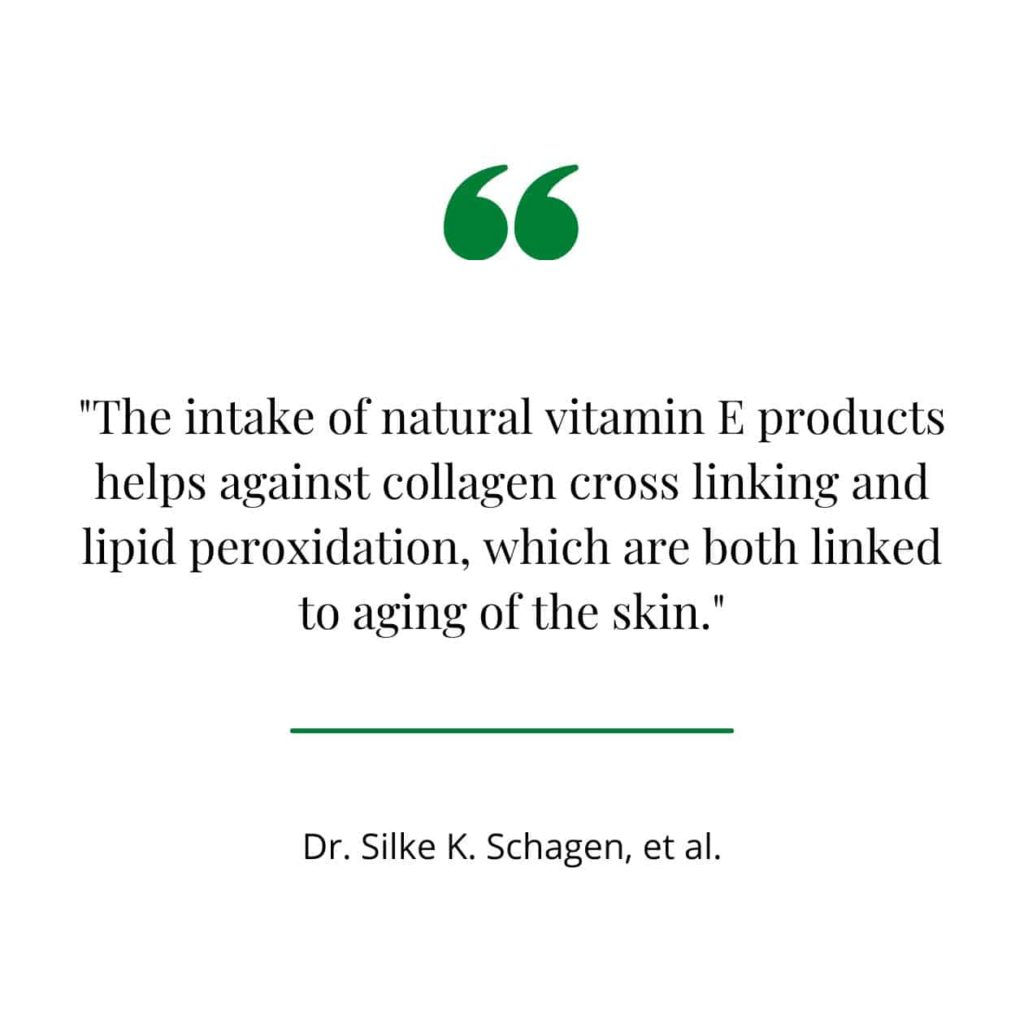
Your daily diet is the building block for collagen support, and it’s critical to get this right. Ideally, you should eat a healthy diet that contains a wide range of nutrients and doesn’t cause your body to create inflammatory chemicals.
Food sources for pure collagen include chicken (with skin on), lean meats, beans, and lentils.
You should also eat foods high in vitamins C and E (for collagen synthesis and cross-linking), as well as antioxidant nutrients such as polyphenols and tocopherols (to safeguard your collagen layer). Zinc is another important one as well.
Finally, you might also avoid high-sugar diets, which have been linked to collagen hardening and fragmentation.
Lifestyle
This is more about maintaining your collagen than increasing it, but there are several things you may do to ensure that your collagen concentrations remain constant.
- Reduce stress. Cortisol levels rise when we are stressed, which research has shown can lower collagen production. When we’re worried, our bodies also send nutrients to the lungs and brain, so the skin doesn’t get as many resources to make adequate collagen.
- Sleep is a condition characterized by prolonged sleepiness and fatigue. Beauty sleep does exist: the REM cycle is when the body’s cells can do most of their cellular renewal, including collagen. During this time, the skin sees an increase in HGH (human growth hormone) in the nighttime sleep cycle. The release of HGH helps to reduce wrinkles and sagging.
- Quit smoking. Studies show that smoking causes collagen levels to dropsignificantly, and smokers also look about 10 years older.
As previously said, use your head when it comes to sun protection. Natural light is an important component of a healthy lifestyle.
Supplementation
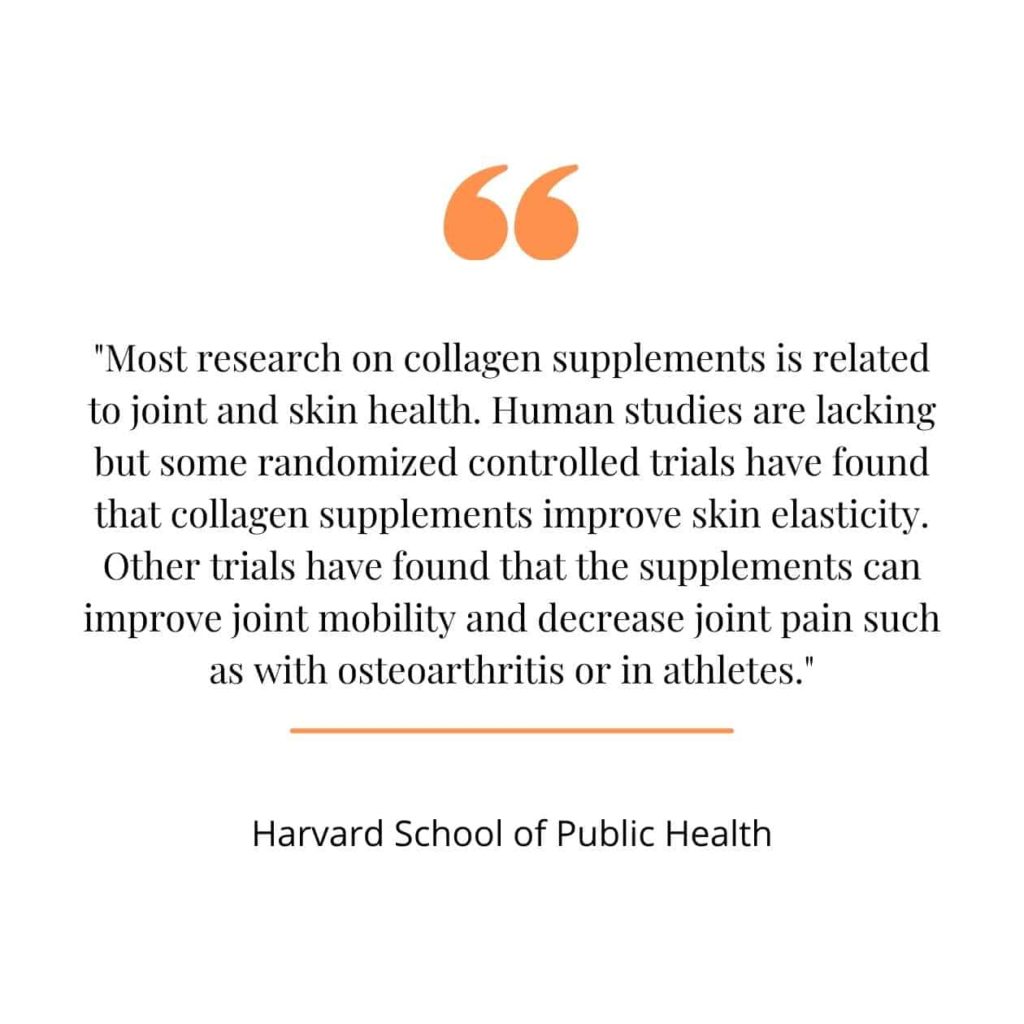
Collagen supplements have gained popularity as a skin health and longevity strategy. They are composed of collagen peptides or short-chain amino acids. They’re able to traverse the body and provide their health benefits after they’ve been absorbed, as demonstrated in studies.
You may anticipate benefits such as improved hydration, smoother skin, and higher quality skin if you have skin. Collagen can improve skin elasticity, making fine lines appear smaller in studies.
A double-blind, randomized, placebo-controlled clinical trial found that participants’ moisture levels in the skin were seven times higher than those who did not take collagen supplements.
Not all collagen pills are created equal, of course. You need to find a high-quality manufacturer who is honest about their manufacturing methods.
There are additional nutrients you may consider that promote collagen synthesis through alternate pathways. This isn’t a comprehensive list, but it’s a good place to start. Here are some of the most efficient options to look for:
Vitamins C, E, and beta-carotene.
These vitamins not only play an important role in collagen synthesis, but they are also essential cofactors for the synthesis of elastin and other proteins that give your skin its firmness.
Vitamin C aids in the synthesis process by aiding in the formation of collagen, while vitamin E is an important fat-soluble vitamin required for proper collagen cross-linking. Both are essential molecules for skin health that provide additional inherent support.
The antioxidant properties of astaxanthin are supported by the presence of other antioxidants in foods that include salmon, trout, crab and lobster.
Astaxanthin is a potent antioxidant with powerful antioxidant effects particularly when it comes to combating free radicals caused by UV exposure (which can harm your natural collagen levels). It also protects your collagen
In Conclusion
Collagen is a protein that helps give our skin its elasticity and strength. It’s also responsible for keeping our skin hydrated.
As we age, collagen production naturally decreases, which can lead to wrinkles, dryness, and a loss of firmness in the skin.
Fortunately, there are many things we can do to protect and restore collagen in our skin – from modifying our diet and lifestyle to using supplements or topical treatments.
We hope this post has helped you better understand the role collagen plays in keeping our skin looking healthy and young!
Organixx Clean Sourced Collagens blend contains five types of collagen from four sources. What’s more, it’s combined with targeted nutrients such as zinc, vitamin C, and vitamin B6 which specifically enhance the bioavailability and potency of collagen. Clean Sourced Collagens is formulated from the ground up to enhance and support your body’s natural ability to heal and rebuild itself from the INSIDE out.

“Our bodies gradually make less collagen as we age, but collagen production drops most quickly due to excess sun exposure, smoking, excess alcohol, and lack of sleep and exercise. With aging, collagen in the deep skin layers changes from a tightly organized network of fibers to an unorganized maze.”
Harvard School of Public Health
Collagen is the most abundant protein in the human body, making up about a third of the total protein. That’s because it’s found just about everywhere! From muscles to bones to skin and nails, collagen is a key part of the body’s connective tissue.
While we tend to think of collagen as something that keeps our skin looking young and plump, it actually plays an important role in many different areas of the body. Collagen is responsible for giving our skin its elasticity and strength, as well as helping to repair any damage that might occur. It’s also essential for the health of our bones, joints, and gut.
In this article, we’ll dive a little deeper into what collagen is and how it works to maintain a healthy and functioning body.
What is collagen?
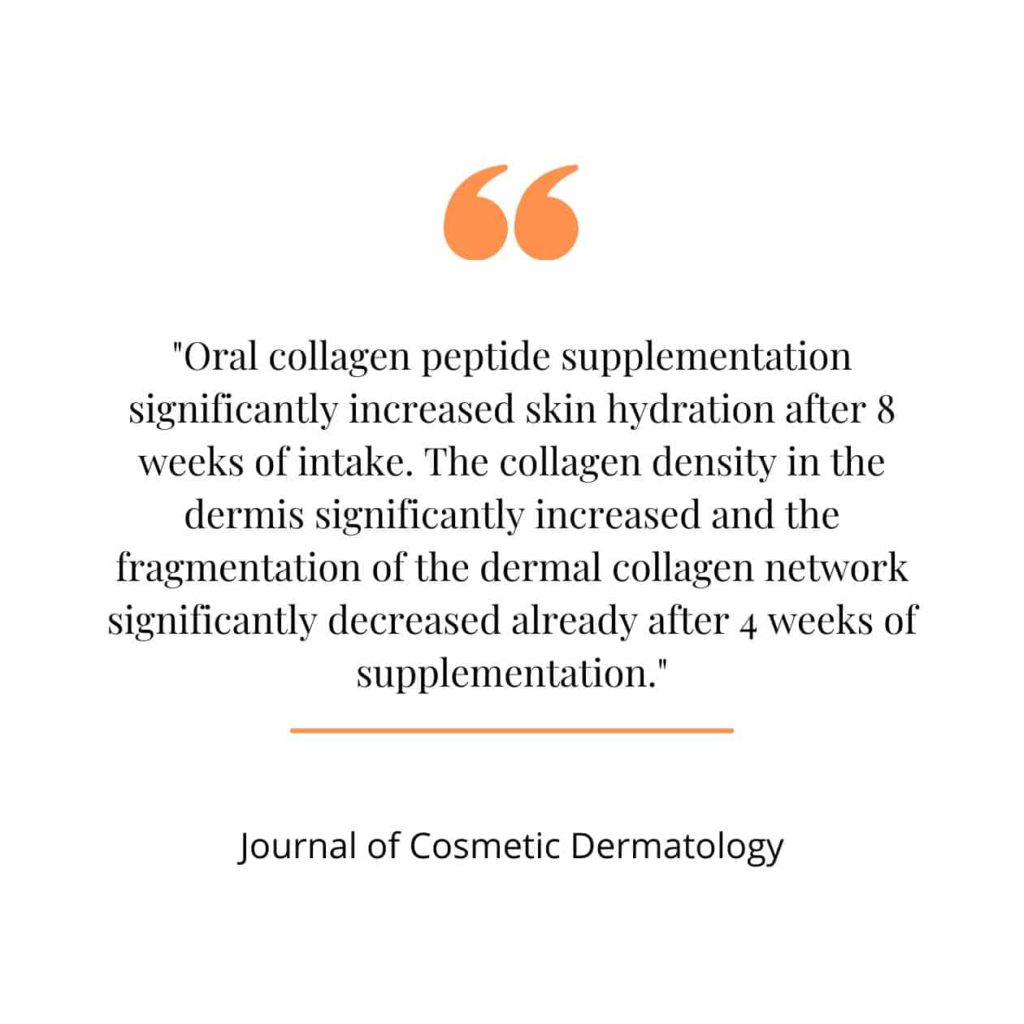
You probably know collagen as a key ingredient in some beauty creams and serums. But what exactly is it? And does it really work?
Collagen is a protein that’s found throughout your body, from your skin to your bones. It’s responsible for creating that youthful “plump” look, as well as giving skin its elasticity and strength.
As we age, our bodies produce less collagen, which leads to wrinkles and sagging skin. That’s where collagen supplements come in. By taking collagen daily, you can help reduce the signs of aging and promote healthy, glowing skin. So if you’re looking for a way to turn back the clock, collagen just might be the answer.
Where does collagen come from?
Collagen is a major component of skin, bones, tendons, ligaments, and other connective tissues. It helps maintain flexibility and strength in these structures. Collagen is made up of three proteins called tropocollagen, proline, and glycine. These proteins form long chains called fibrils.
Collagen fibers are arranged in bundles called fascicles. In humans, collagen is produced primarily in the dermis, the layer of tissue beneath the epidermis, or the skin.
What is collagen made of?
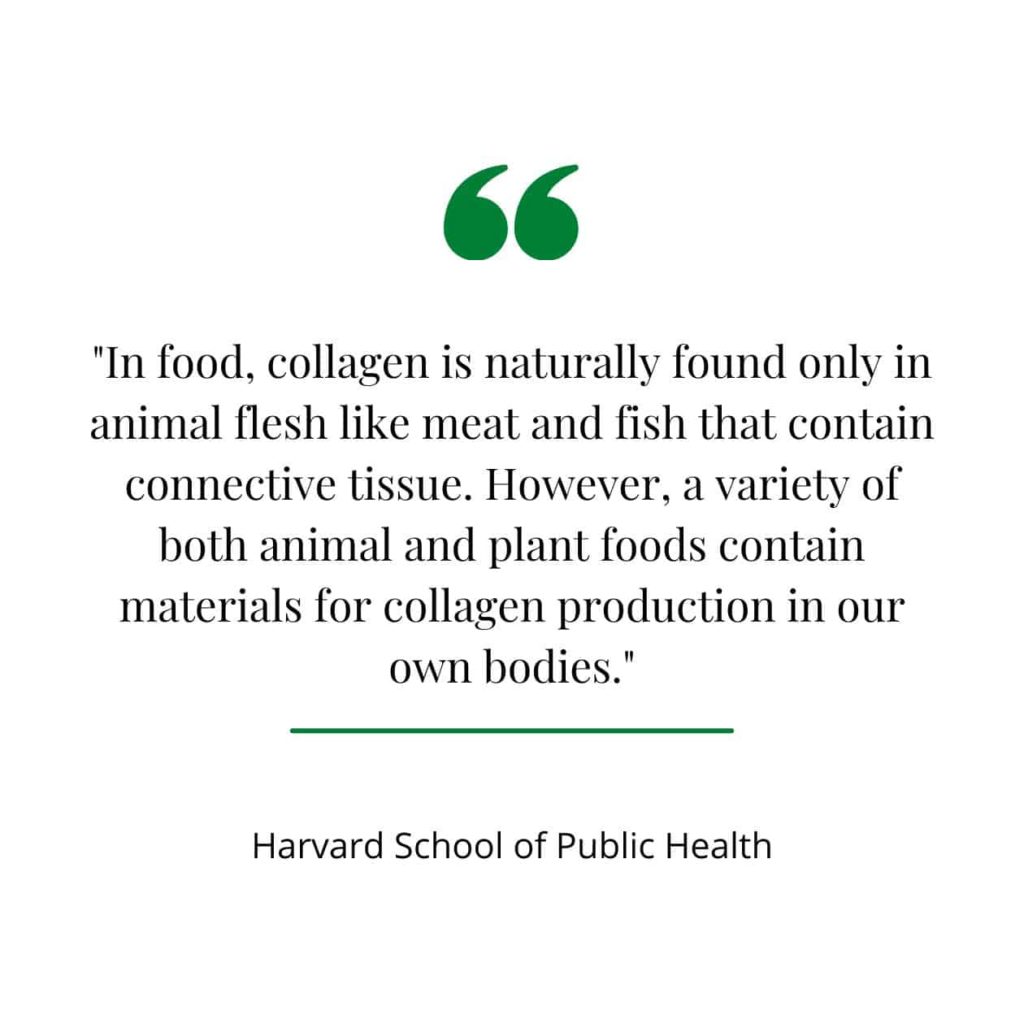
As we mentioned, collagen is made up of three proteins: tropocollagen, proline, and glycine. Tropocollagen is the main structural protein found in collagen. It’s made up of two other proteins, proline and glycine. Proline makes up about 20% of the amino acids in tropocollagen, while glycine makes up about 50%.
Glycine is also the simplest amino acid, and it’s responsible for giving collagen its unique structure. This structure allows collagen to form strong bonds with other proteins, which is what gives it its strength.
What does collagen do?
For the most part, collagen helps keep our skin looking young and healthy. It gives our hair strength and thickness, and it keeps our nails strong. It also helps maintain the flexibility and strength of our bones, ligaments, and tendons. Basically, what doesn’t collagen do!
What are the different types of collagen?
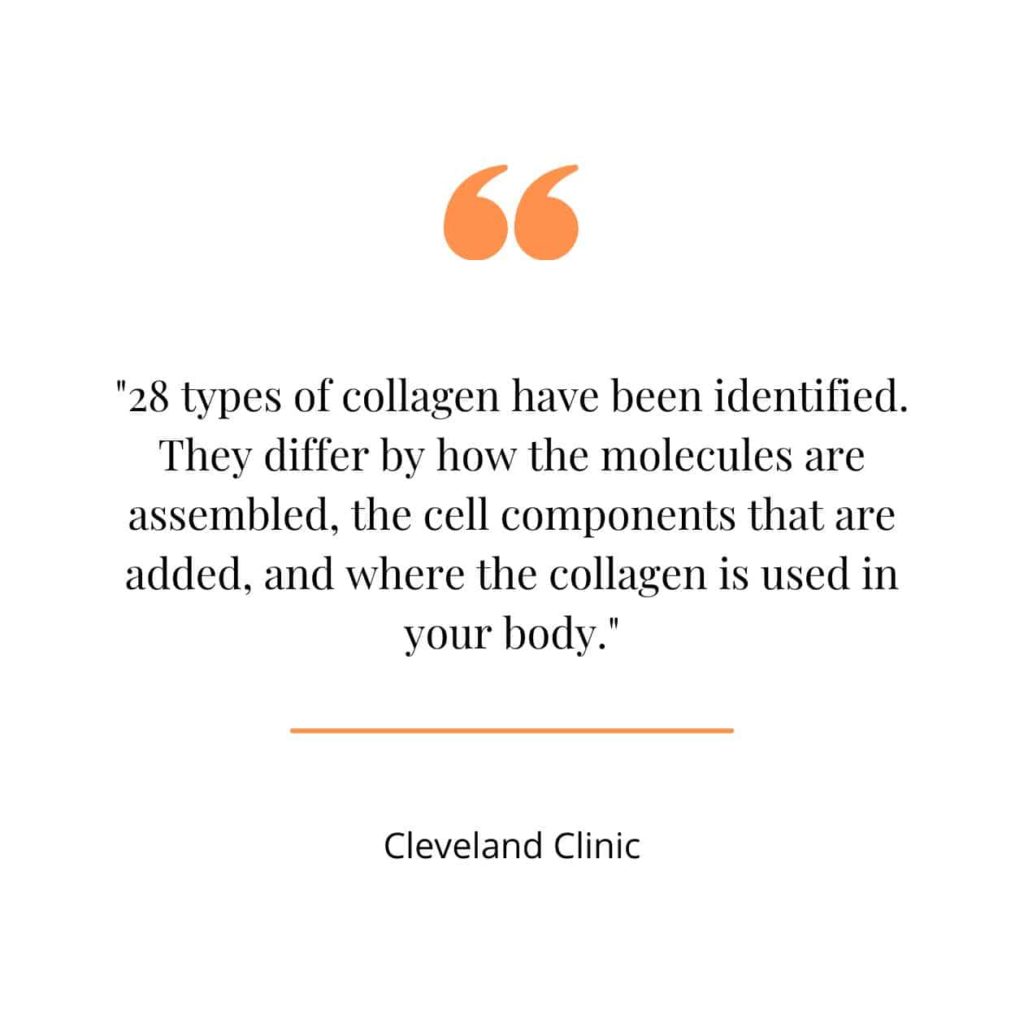
Collagen is a protein that helps our bodies stay strong. There are three main kinds of collagen. Types 1, 2, and 3 make up the majority of the human body. These are the most abundant types of collagen in the body.
Type I collagen is a major structural protein found in the extracellular matrix of connective tissue. It’s composed of two left-handed helical chains that coil around each other to form a triple helix. Supplementing with type I collagen has been shown to improve skin health, reduce inflammation, and support healthy joints. Additionally, type I collagen is readily available from animal sources, making it an easy and convenient way to improve your health as you age.
Type II collagen is a structural protein found in cartilage. It’s made up of two left-handed helical chains that twist around each other to form a double helix. Type II collagen supplements have been shown to reduce joint pain and stiffness, and slow the progression of osteoarthritis.
Type III collagen is a structural protein found in skin, muscles, and blood vessels. It’s made up of two left-handed helical chains that coil around each other to form a triple helix. Type III collagen supplements have been shown to improve skin elasticity and reduce the appearance of wrinkles. Additionally, type III collagen is readily available from animal sources, making it an easy and convenient way to improve your skin health as you age.
Scientifically proven ways to increase collagen production
There are several ways to increase collagen production and slow the aging process. Here are a few scientifically proven methods:
Although our bodies produce collagen naturally, the production of collagen declines as we age. This leads to the formation of wrinkles, fine lines, and other signs of aging.
1. Eat a diet rich in vitamin C: Vitamin C is a key nutrient for collagen production. It helps the body synthesize collagen and provides antioxidant protection against free radical damage. Free radicals can break down collagen, leading to wrinkles and other signs of aging. Foods that are rich in vitamin C include citrus fruits, bell peppers, broccoli, kale, and strawberries.
2. Get enough sleep: Sleep is important for overall health, and it also plays a role in collagen production. When we sleep, our bodies produce more human growth hormone (HGH), which helps to stimulate collagen production. Additionally, sleep deprivation has been shown to increase the breakdown of collagen.
3. Exercise: Exercise is good for your health in many ways, and it also helps to increase collagen production by delivering the proper nutrition via exercise. When we exercise, our bodies produce more HGH, which helps to stimulate collagen synthesis. Additionally, exercise has been shown to reduce the breakdown of collagen.
4. Limit sun exposure: Ultraviolet (UV) radiation from the sun can damage the skin and lead to wrinkles and other signs of aging. It’s important to limit sun exposure and wear sunscreen to protect the skin. Additionally, UV radiation has been shown to break down collagen.
What are the benefits of collagen for your body?
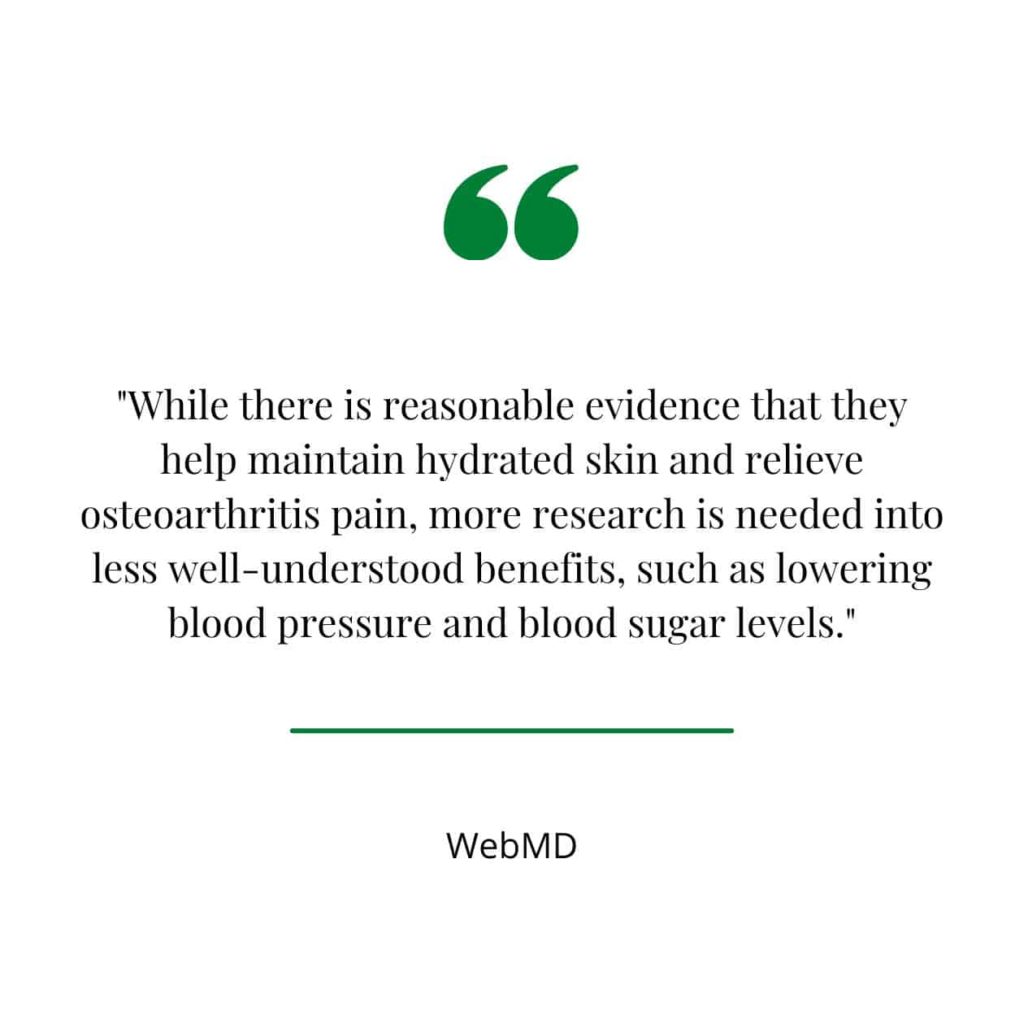
Collagen is a vital protein found in our bodies. It provides structural support to our muscles, bones, ligaments, tendons, cartilage, blood vessels, and skin. When collagen is combined with other proteins, it creates stronger connective tissue, making our skin more resilient.
Can you eat collagen?
Yes, collagen is a food protein and is safe to eat. Collagen supplements are typically made from animal sources, such as bovine or fish. However, there are also vegan collagen supplements made from plant-based sources, such as soy.
Collagen supplements are available in powder, tablet, and capsule form. They can be added to smoothies, juices, soups, and other foods.
How can you get more collagen?
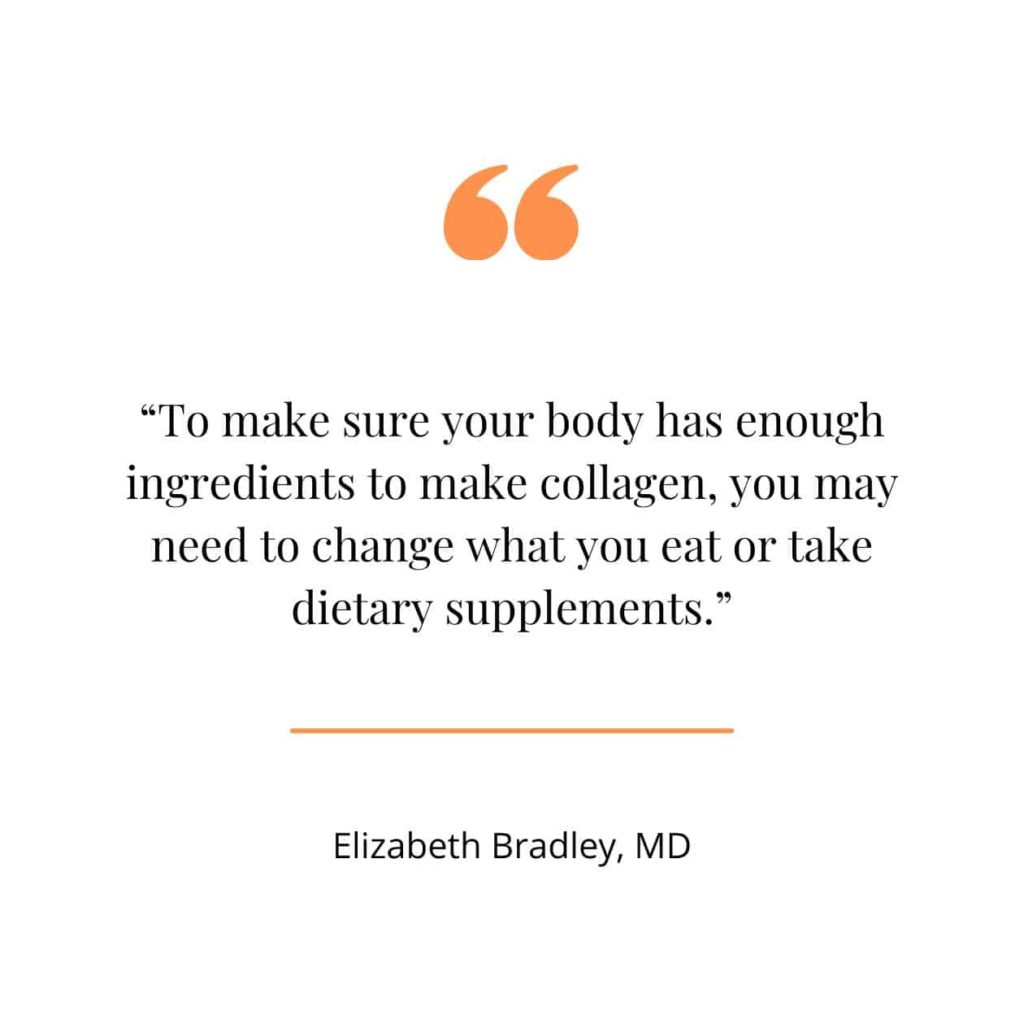
There are plenty of ways you can attempt to boost your natural collagen production. This includes things like taking clean-sourced, organic collagen supplements in the form of pills, powders, or beverages, eating collagen-rich foods, using topical collagen treatments, and protecting your skin from UV damage.
While some of these methods may be more effective than others, taking measures to protect your existing collagen is just as important as increasing production. This includes things like avoiding excess sugar, managing stress levels, sleeping enough, and not smoking.
Food containing collagen
If you don’t like the idea of dissolving powders or taking a pill, you’re in luck! There’s ample collagen to be found in foods that you eat on a daily basis!
Some foods that contain collagen include:
- Bone broth
- Fish
- Organ meats
- Eggs
- Dark leafy greens
- Citrus fruits
- Berries
- Garlic
- Green tea
Is bone broth healthy?
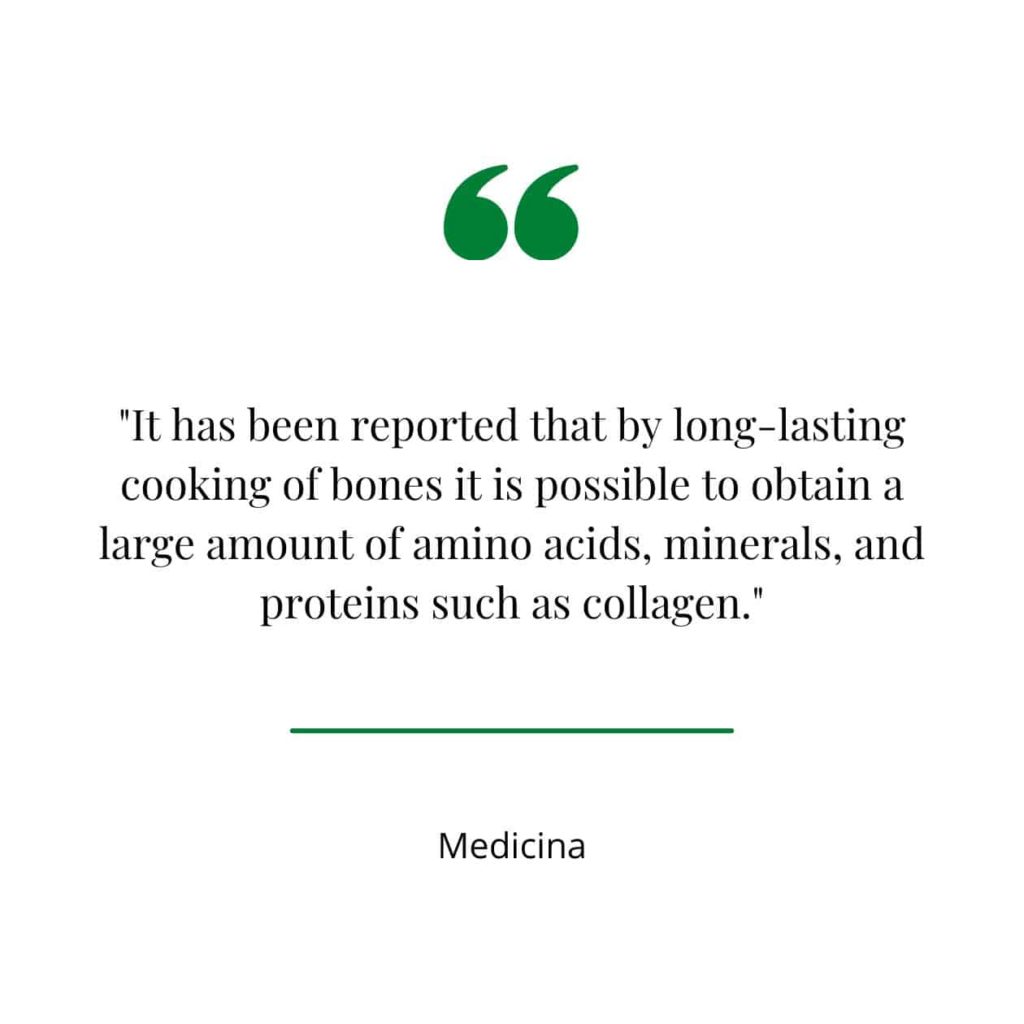
Bone broth is a healthy food that’s rich in collagen. It’s also a good source of other nutrients, such as amino acids, minerals, and gelatin. Bone broth can be made at home using bones from chicken, beef, or fish. It can also be purchased online or at some health food stores.
Potential health benefits of collagen supplements
While more research is needed, reviews of those currently using collagen supplements have noticed several benefits to boosting their collagen intake. These include:
1. Strong Cartilage and Muscles
Hydrolyzed collagen supplements have been shown to improve joint pain and stiffness in people with osteoarthritis. Additionally, it may help to build muscle mass and reduce the risk of exercise-related injuries.
2. Healthy Teeth
One benefit that many people don’t know about taking collagen supplements is the support it gives to the teeth and enamel! The collagen found in these supplements helps to reduce the risk of tooth decay and gum disease and keep those chompers looking as strong as ever!
3. Thick Hair
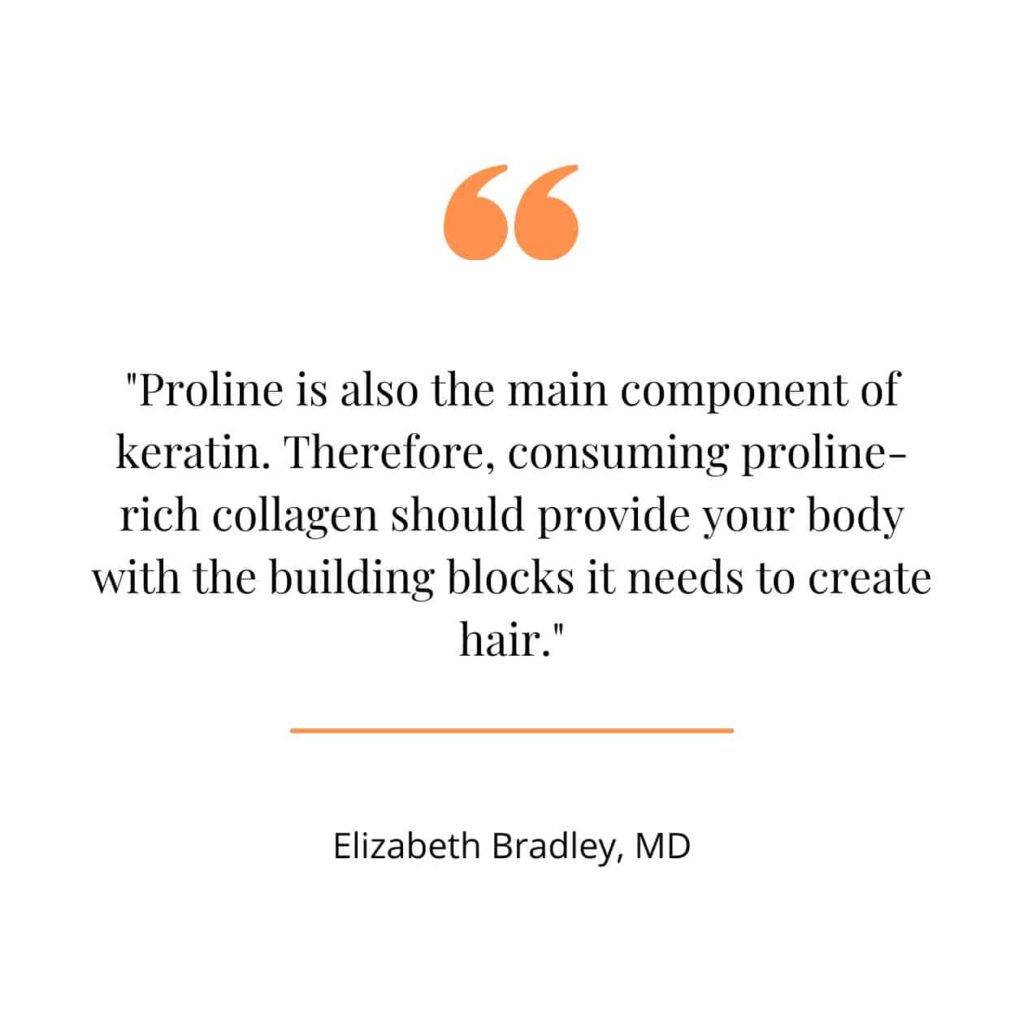
Another external beauty-related benefit that comes from taking collagen supplements is the promotion of thick and lustrous hair, as well as strong nails. This is due to the fact that collagen is a key structural protein in both of these areas.
4. Smooth Skin
Of course, one of the most popular reasons people take collagen supplements is for the improvement of the skin when administered topically. This includes a reduction in wrinkles, dryness, and other signs of aging. Additionally, it can help to heal wounds and scars more quickly.
Potential risks of collagen supplements
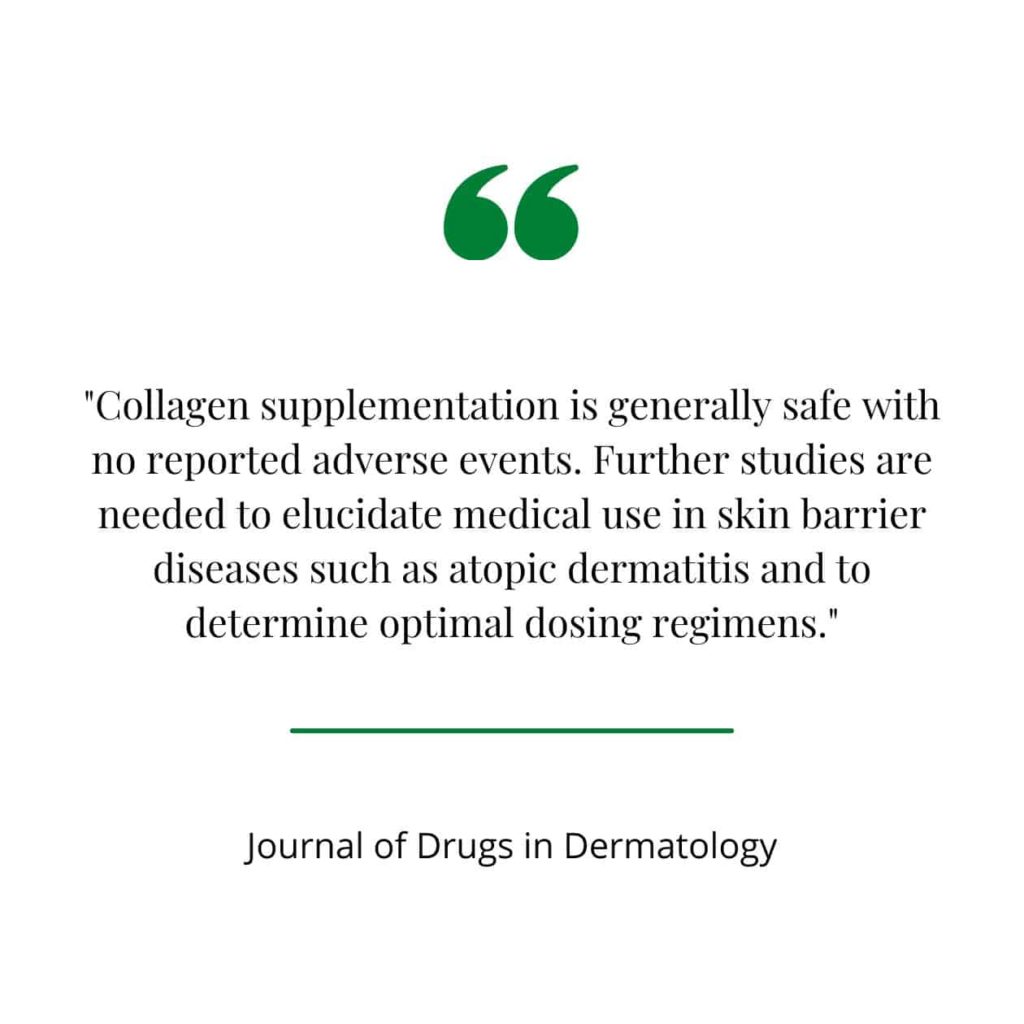
There are very few risks associated with taking collagen supplements. However, it’s important to note that they may not be suitable for everyone. For example, those who are allergic to fish or other seafood may want to avoid marine-based collagen supplements. Additionally, people with shellfish allergies should avoid supplements made from oysters.
It’s also important to speak with a healthcare professional before taking any type of supplement, especially if you have a medical condition or are taking medication. This is because collagen supplements may interact with certain medications, such as blood thinners.
How to help your body create collagen naturally
There are two basic kinds of collagen. The first is endogenous collagen, which is naturally produced and synthesized by the body. The other is exogenous collagen which comes from an outside source such as pills and powders in supplement form as well as directly from animal products, such as bone broths.
Unfortunately, it’s part of the “normal” aging process that by the time we reach around age 30, our natural, endogenous collagen production begins to wane. For most people who chose to eat the Standard American Diet (SAD) and live a sedentary yet stressed-out lifestyle, it pretty much goes downhill from there.
As internally created collagen production lessens, the result is not only wrinkles and sagging skin, but also joint pain, aching muscles, blood pressure issues, digestive complications, and increased susceptibility to many kinds of chronic disease. There is a light at the end of the tunnel, however.
As with any essential substance, it is always best to eat a diet and live a lifestyle that promotes the healthy synthesizing of your own natural healing and repair mechanisms. This goes for collagen production as well.
To Sum Up
The main takeaway of this article is that collagen is an important structural protein that offers a wide range of health benefits. It’s found in the connective tissues of animals, including the skin, muscles, tendons, and bones. Collagen supplements have become increasingly popular in recent years due to their potential ability to improve joint pain, skin health, gut health, and more. However, it’s important to speak with a healthcare professional before taking any type of supplement. Additionally, there are ways to help your body create collagen naturally by eating a healthy diet and living an active lifestyle.
If you’re interested in beginning your journey of collagen supplementation, reach out today! Browse through plenty of clean-sourced, organic collagen products and find something that’s going to work for you!
Organixx Clean Sourced Collagens blend contains five types of collagen from four sources. What’s more, it’s combined with targeted nutrients such as zinc, vitamin C, and vitamin B6 which specifically enhance the bioavailability and potency of collagen. Clean Sourced Collagens is formulated from the ground up to enhance and support your body’s natural ability to heal and rebuild itself from the INSIDE out.

You may have heard that increasing your collagen levels can do wonders for your skin, but did you know that collagen is also needed for healthy hair production? With the right amount of collagen at your body’s disposal, you can have thicker and more lustrous locks.
Collagen and Hair: What’s the Connection?
Collagen is the primary protein in all animals (including people). It helps to maintain structural integrity in bones, tendons, cartilage, and ligaments.
Collagen also plays a big part in renewing cells in general, and the cells in hair are no exception. The body relies on the amino acids found in collagen to create hair strands, which are made primarily of a tough protein cousin to collagen called keratin.
Collagen is a building-block protein for hair as it surrounds and protects each strand. Collagen also helps to protect hair from the damaging effects of too much sun, as well as chemical irritants in the water and toxins in the air and soil. It possesses antioxidant properties which help to fight free radicals in the body.
Why We Lose Hair as We Age
 As we get older, our collagen levels decrease. This is considered a “natural process” that will continue unabated – unless we’re proactive in curbing the decline through proper diet, lifestyle, and supplementation.
As we get older, our collagen levels decrease. This is considered a “natural process” that will continue unabated – unless we’re proactive in curbing the decline through proper diet, lifestyle, and supplementation.
Some estimate that by the time a woman is in her 50s, her collagen levels may have declined by as much as 40%. With less collagen to protect it, hair falls victim to free radicals and begins to weaken. Dull, listless hair, graying, and even patterned baldness may be the result.
Both male and female pattern baldness affects millions in the U.S. alone. According to statistics gathered by the American Hair Loss Association [1], by the time most men are age 35, two-thirds of them will be experiencing some degree of hair loss.
Another survey found that roughly 50% of women over 65 will experience thinning of their hair at some point in their later years. For both women and men, hair loss (especially at a young age) can lead to depression as well as social isolation.
The Link Between Decreasing Collagen and Thinning Hair
Hair loss can occur for a number of reasons. A few possible causes include:
- iron deficiency
- zinc deficiency
- free radical damage
- low thyroid levels
- autoimmune disease
- hormonal imbalances
Another huge reason for hair loss and thinning is collagen deficiency, especially as we age. In 2016, researchers from the Tokyo Medical and Dental University [2] found that aging mice had thinner hair follicles than younger mice and the common denominator was collagen. The investigators discovered the link between decreasing collagen levels in stem cells near hair follicles, especially type XVII, and hair loss.
In an earlier Japanese study [3], investigators studied the scalps of women over 50 and found that they had smaller hair follicles than women in their 30s and even 40s. These discoveries could lead to possible remedies for pattern baldness in both men and women where augmenting collagen stores in the body may play a major role.
Collagen Benefits for Hair
Happily, other studies have also discovered the link between collagen supplementation and the return of healthy hair. A 2012 study conducted at the University of California, Los Angeles, found that supplementing with collagen promoted “significant” hair growth in women with hair thinning. They also determined that collagen supplements were safe and effective [4].
Studies like these are promising news for people of all ages who want to regrow hair; this can be life-changing and even life-saving for some. Many studies, such as a 2001 investigation conducted by the University Hospital of Wales, have linked alopecia (a condition where hair falls out) with loss of self-confidence and low self-esteem.
for some. Many studies, such as a 2001 investigation conducted by the University Hospital of Wales, have linked alopecia (a condition where hair falls out) with loss of self-confidence and low self-esteem.
Visible hair loss also seems to take its psychological toll on women more than on men. An older survey study [5] conducted in the Netherlands found that women who had hair loss scored higher for “inadequacy, rigidity and general psychological maladjustment” as well as having more psychosocial problems than men who had the same condition.
Collagen may also help hair that is dry, brittle, or gray as well. As stated earlier, collagen supports the health of each hair follicle. At the intersections where collagen and keratin meet are also where the pigment is produced that gives your hair its unique color.
Restoring the right levels of collagen to hair follicles and cells around the hair could help bring back pigment. Its hair-supporting nature is also the reason why having the right amount of collagen in your system can help dull, drab, split-end hair regain its shine and luster as well as retain moisture.
Use Only the Best Collagen Supplement for Hair Growth
There is ample evidence to support the notion that raising the bar on your collagen levels, in general, may help bring back healthy hair. You can do this is many ways. Reducing stress and eating a diet that is rich in amino acids and minerals such as zinc, iron, and vitamin C is definitely one step.
Broccoli, bell peppers, dark, leafy greens, and fish like salmon (which contains high amounts of omega-3s) are just some examples of foods that can help support the natural mechanisms in the body that build collagen.
Collagen supplementation is also a good option for restoring low collagen levels. Be sure you obtain the best collagen supplement for your needs that is of the utmost quality.



